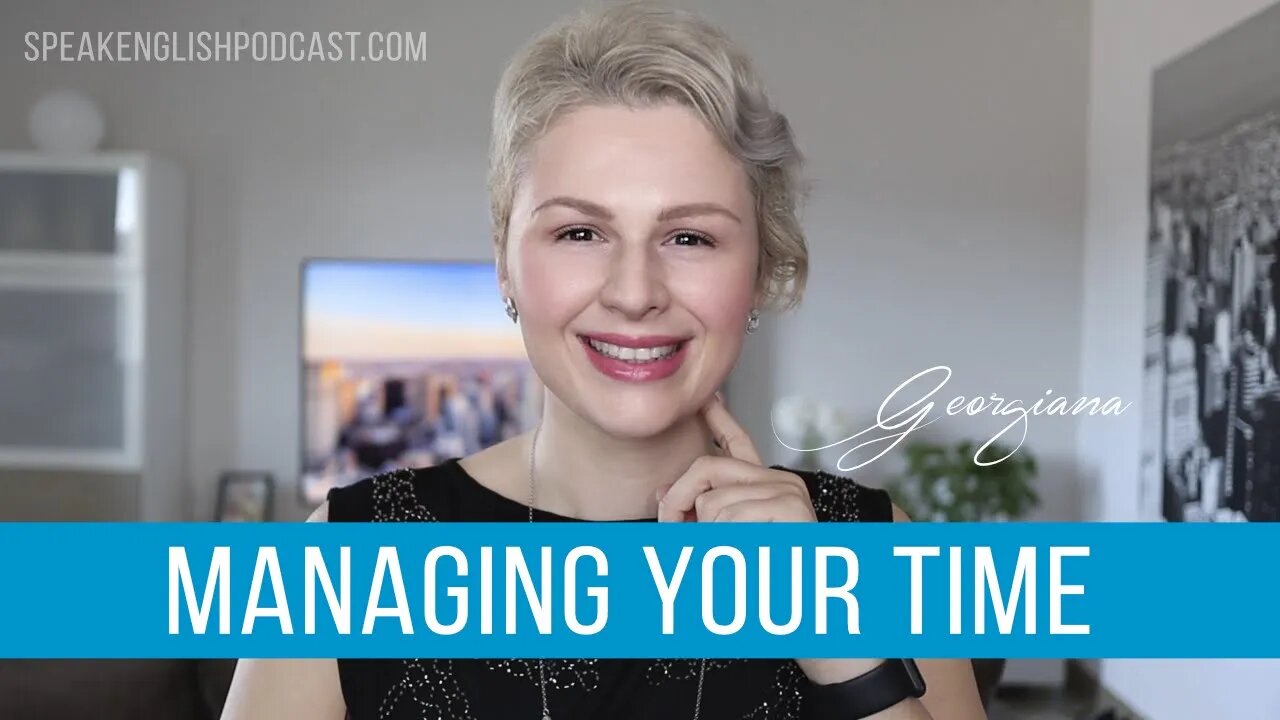Premium Only Content

#210 Managing your English learning time
#210 Managing your English learning time
Get the transcript here: https://SpeakEnglishpodcast.com/podcast
Listen to a new episode of Speak English Now Podcast, your favorite material for practicing your spoken and heard English. You will also learn about lifestyle and culture, language, vocabulary, and how to improve your English more effectively.
Transcript:
– I first eat a donut and then listen to some English to motivate myself.
– I see. That’s why you’re so fat. So, how’s your English?
– Good, good. A donut?
Hi, everybody! I am Georgiana, your English teacher and founder of SpeakEnglishPodcast.com. My mission is to help you speak English fluently.
Today, I’m going to talk about managing your English learning time.
Next, you will practice your speaking with a mini-story.
But before we start, please visit my website, SpeakEnglishPodcast.com/podcast to get the transcript of this episode. It’s completely free.
Very good. Have you ever wondered how to find more time to do something? I ask myself that all the time. In fact, I think time runs away from me, and I don’t have time to chase it.
The truth is time flies. And it flies for everyone. We always have something to do in today’s society, and there is never time for anything. But don’t despair. Even in these circumstances, you can find a good strategy to learn English.
As you know, my system is based on listening. Therefore, it is a significant advantage since you can take the lessons wherever you want on your mobile, tablet, or laptop. There is no need to sit in front of the computer and start studying.
In fact, I think very few people can do that consistently.
So, today, I’m going to give you some ideas about managing your English learning time.
#1 Free time during the day
We waste many minutes that we could be putting to good use throughout the day. The list is endless: driving the car; waiting in line at the bank; cleaning the house; walking the dog; ironing, etc.
If you add up all those minutes, you might be surprised how much time is wasted.
So, it’s a good idea to try to make the most of all this free time.
One objection I sometimes get is the following:
You can’t be 100% focused if you’re doing something else, like driving a car.
Yes, it’s true that you may not be fully focused, but let me tell you a secret. Your brain is always learning, even if you don’t always pay close attention. For example, if you listen to a song without paying attention, you may later hum the melody without realizing it.
Let’s say you listen for 1,000 hours during a year. 200 hours at full concentration. 500 hours at medium concentration and another 300 hours at low concentration.
You will have listened for 700 hours at high or medium concentration, which is not bad at all. And even if you’re not paying much attention during those 300 hours, they’re still useful.
Think of it this way: When you learned your native language, you weren’t 100% focused every time you heard something—many times, you weren’t paying attention.
When I learned Spanish, I spent a lot of time listening. And I wasn’t always focused, but I accumulated hours and hours of listening, and I got much better over time.
#2 Small daily actions have a massive impact over time.
One day, I heard this idea. A person was complaining that he didn’t have time to read. He hadn’t opened a book in years. So, someone made this reasoning to him:
“Let’s say you only spend 10 minutes a day reading. Maybe 5 minutes in the morning and 5 minutes in the evening. I think that’s a very modest goal. Let’s do the math. If you take 1 minute to read one page, that’s 10 pages a day. A month has 30 days, so you would read 300 pages. This is roughly equivalent to an average-sized book.
Reading one book per month equals 12 books per year. Over five years, that would be 60 books. So, imagine now that you go to a library and pick out 60 books. This would be what you would have learned, just by reading 10 minutes a day in 5 years.”
I find the idea fascinating, as it shows in a very simple way how much time you can accumulate by devoting it to one thing consistently. I usually recommend at least an hour a day of listening, but if you can’t, you can listen less. Over time, you will realize how much you are learning.
-
 10:37
10:37
Speak English podcast with teacher Georgiana
2 years ago249 Zoom Business Meetings in English
335 -
 UPCOMING
UPCOMING
The Shannon Joy Show
1 hour ago🔥🔥World War III? Israel Pummels Iran And The War Drums Are Beating. Are You Ready To Send Your Sons & Daughters? 🔥🔥
108 -
 UPCOMING
UPCOMING
Tudor Dixon
46 minutes agoTrump, Musk & the Media Machine with Miranda Devine | The Tudor Dixon Podcast
2 -
 1:01:27
1:01:27
VINCE
3 hours agoYou'll Never Believe The Left's Latest Ridiculous Tactic | Episode 64 - 06/13/25
156K159 -
 DVR
DVR
LFA TV
13 hours agoLFA TV ALL DAY STREAM - FRIDAY 6/13/25
89K17 -
 LIVE
LIVE
Bannons War Room
3 months agoWarRoom Live
15,282 watching -
 DVR
DVR
Benny Johnson
2 hours ago🚨Trump RAGES After Israel Bombs Iran in Massive Attack, World War 3: ‘They’re All DEAD!’
32.2K43 -
 LIVE
LIVE
The Big Mig™
4 hours agoMiddle East Meltdown, We All Lose
4,390 watching -
 LIVE
LIVE
Caleb Hammer
1 hour agoDave Ramsey Was Wrong, Now She's F*cked | Financial Audit
115 watching -
 35:36
35:36
Rethinking the Dollar
2 hours agoBombs Drop, Stocks Flop & GOLD Pops | Morning Check-In
10K1